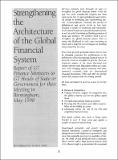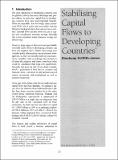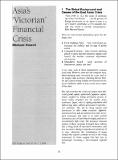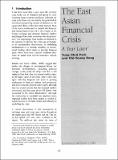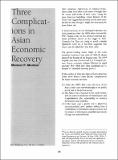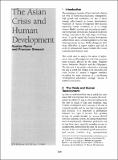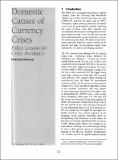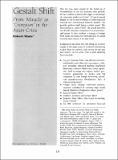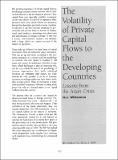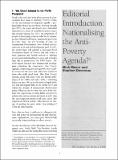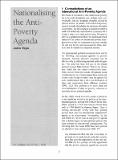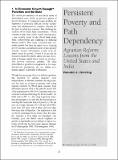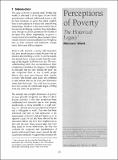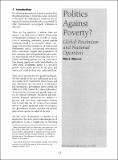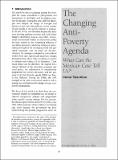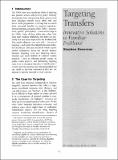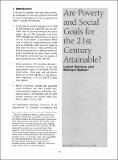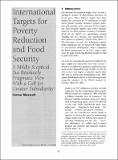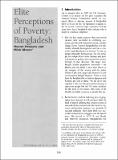Volumes 21 - 30: Getting Institutions Right for Women in Development: Recent submissions
Now showing items 401-420 of 444
-
Strengthening the Architecture of the Global Financial System:
(Institute of Development Studies, 01/01/1999)Summary More timely and accurate information on countries' economic situations – in particular on foreign reserves – is required for proper risk assessment. Capital account liberalisation can bring benefits but needs to ... -
Stabilising Capital Flows to Developing Countries
(Institute of Development Studies, 01/01/1999)Summary The East Asian financial crisis is linked to volatile short?term capital flows. Restrictions on short?term inflows should be contemplated to cope with large surges in these capital flows. There is also a need to ... -
“If You Want to Get Somewhere Else, You Must Run at Least Twice as Fast as That!”: The Roots of the East Asian Crisis
(Institute of Development Studies, 01/01/1999)Summary Most East Asian economies have been following growth trajectories which involve ever?intensifying competition in external product markets. The financial crisis of 1997–98, whilst clearly having roots in the ... -
Asia's ‘Victorian’ Financial Crisis
(Institute of Development Studies, 01/01/1999)Summary Like the European economic crises of the nineteenth and early twentieth centuries, the crisis in East Asia is essentially an overproduction crisis. As in other such episodes, the East Asian case was characterised ... -
The East Asian Financial Crisis: A Year Later
(Institute of Development Studies, 01/01/1999)Summary Park and Song argue that the capital inflow into Southeast Asia was driven by foreign investors. The maturity structure of foreign denominated liabilities shortened in the wake of mounting problems in export ... -
Three Complications in Asian Economic Recovery
(Institute of Development Studies, 01/01/1999)Summary Three features in the Asian economic crisis complicate recovery. First, because the crisis is centred in the private sector, the recognition and workout of losses, especially on the part of stock?holders of financial ... -
The Asian Crisis and Human Development
(Institute of Development Studies, 01/01/1999)Summary The article analyses from a Human Development perspective the adjustment process in five Asian countries seriously affected by the crisis. The previous impressive record in improving human development was due to ... -
Domestic Causes of Currency Crises: Policy Lessons for Crisis Avoidance
(Institute of Development Studies, 01/01/1999)Summary Reisen stresses that domestic causes of currency crises can be endogenous to the international financial system. Net capital transfers imply current account deficits on the recipient side. Sustained capital inflows ... -
Gestalt Shift: From ‘Miracle’ to ‘Cronyism’ in the Asian Crisis
(Institute of Development Studies, 01/01/1999)Summary Crisis explanations focussing on either domestic vulnerabilities or moral hazard do not seem to cover the Asian crisis well, while hypotheses focussing on investor panic appear to be more consistent with the ... -
The Volatility of Private Capital Flows to the Developing Countries: Lessons from the Asian Crisis
(Institute of Development Studies, 01/01/1999)Summary Eurodollar markets have a decisive role in creating liquidity, which contributed to overinvestment in emerging economies. IMF responses to the situation failed to prevent currency crises but there may be some ... -
Editorial Introduction: Nationalising the Anti?Poverty Agenda?
(Institute of Development Studies, 01/04/1999) -
Nationalising the Anti?Poverty Agenda
(Institute of Development Studies, 01/04/1999)Summaries Although the return in the 1990s of the issue of poverty reduction to the agenda of international organisations is very welcome, an important obstacle to further progress remains. To date, the anti?poverty agenda ... -
Persistent Poverty and Path Dependency: Agrarian Reform: Lessons from the United States and India
(Institute of Development Studies, 01/04/1999)Summaries The historical experience of the United States, where aggregate wealth multiplied in abundance but persistent poverty is glaring, offers concrete illustration that growth is not a sufficient condition for poverty ... -
Perceptions of Poverty: The Historical Legacy
(Institute of Development Studies, 01/04/1999)Summaries The legacy of past perceptions of poverty and its causes have been embodied in many core approaches to measure it. In turn, the way poverty is identified and quantified, particularly in money metric terms and ... -
Politics Against Poverty?: Global Pessimism and National Optimism
(Institute of Development Studies, 01/04/1999)Summaries Is it politically feasible for the governments of developing countries to redistribute significant assets or income to the poor? There is a great deal of scepticism within international development circles. This ... -
The Changing Anti?Poverty Agenda: What Can the Mexican Case Tell Us?
(Institute of Development Studies, 01/04/1999)Summaries This article analyses how the strategies conceptualised by anti?poverty policymakers in international institutions are transferred into national?level policies in developing countries. The Mexican government's ... -
Targeting Transfers: Innovative Solutions to Familiar Problems
(Institute of Development Studies, 01/04/1999)Summaries The case for targeting cash or in?kind transfers to the poor – that it maximises cost?effectiveness and equitable allocation of scarce public resources – is partially offset by the administrative, social and ... -
Are Poverty and Social Goals for the 21st Century Attainable?
(Institute of Development Studies, 01/04/1999)Summaries The article assesses the prospects for countries attaining two important International Development Goals (IDGs) by the year 2015: halving the proportion of people living in extreme poverty; and reducing by two ... -
International Targets for Poverty Reduction and Food Security: A Mildly Sceptical But Resolutely Pragmatic View With a Call for Greater Subsidiarity
(Institute of Development Studies, 01/04/1999)Summaries International development targets adopted by UN Conferences provide political impetus, focus expenditure and help in monitoring progress. However, simple targets can misrepresent complex realities and distort ... -
Elite Perceptions of Poverty: Bangladesh
(Institute of Development Studies, 01/04/1999)Summaries The Bangladeshi national elite are distanced from and unthreatened by poverty and the poor. Medium?term solutions to poverty, resting on a belief in the importance of ‘increasing awareness’ through education, ...

